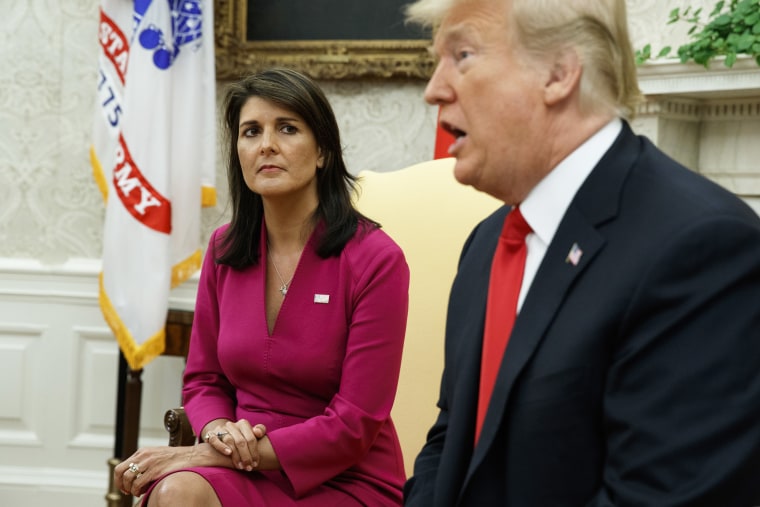Former U.N. ambassador and South Carolina Gov. Nikki Haley became the second candidate to throw her hat in the ring for the 2024 presidential race on Tuesday, pitting herself against her former boss, Donald Trump. Haley has immediately sought to give the impression that she has something fresh to offer. She called for America to “move past the stale ideas and faded names of the past” and to embrace a “new generation to lead us in to the future.” The New York Times has framed Haley’s campaign as an attempt to “break with the Trump era,” and Vox reports that Haley is presenting herself as a “moderate” alternative to Trump.
But watch Haley’s first campaign video introducing her candidacy to voters, and you’ll quickly see that Haley isn’t bucking MAGA politics; she’s operating firmly within its parameters. So far Haley’s campaign looks like less an alternative to Trump than a candidate-centric bid to claim the MAGA torch for herself.
Haley charges straight into culture wars over American identity at the core of today’s MAGA worldview.
Haley’s video kicks off with her talking about the importance of looking for “similarities” among people, which seems to suggest she might be seeking to be a unity candidate. But about 30 seconds into her launch video, Haley charges straight into culture wars over American identity at the core of today’s MAGA worldview. “Some look at our past as evidence that America’s founding principles are bad. They say the promise of freedom is just made up,” Haley quietly says as a sentimental piano score plays in the background. “Some think our ideas are not just wrong, but racist and evil. Nothing could be further from the truth.”
As she speaks, a montage shows a woman talking about the “1619 Project,” The New York Times Magazine initiative which places slavery at the center of American historical narratives; Rep. Alexandria-Ocasio-Cortez of New York speaking at a rally for Sen. Bernie Sanders; and protesters criticizing racism and burning the American flag. While Haley’s voice is gentle, her ideas are confrontational in an all-too-familiar way. She immediately establishes progressives as villains, and implies antiracism and socialist left politics constitute hatred of America’s essence. Later in the video, she decries what she describes as the socialist left’s desire to “rewrite history” — a clear alignment with right-wing hysteria over critical race theory.
Then in a nod to her experience as Trump’s ambassador to the U.N., Haley points the finger at Iran and China as the real “evil” countries of the world, and points out how by contrast the U.S. looks pretty good. “Even on our worst day, we are blessed to live in America,” she seems to take consolation in saying.
The other most remarkable part of the video is the way Haley presents the most iconic moment of her governorship of South Carolina: her response to the white supremacist Dylann Roof’s murder of nine Black churchgoers at Emanuel African Methodist Episcopal Church in 2015. If Haley were running as a moderate, this would be the perfect opportunity to showcase opposition to extremist white nationalism, particularly given Trump’s friendliness toward Neo-Nazis in Charlottesville and Proud Boy insurgents. Instead, the video footage skips from the image of the ambulance to her at a prayer service, and says, “When evil did come, we turned away from fear, toward God.” The threat coming from the extremist elements of her own political movement go unnamed — and her solution is … religion. Haley also omits what was probably her most striking political pivot in office — her decision to remove the Confederate flag from the South Carolina Capitol in the wake of the mass shooting. That would’ve been her most unique opportunity to distinguish herself from the “stale ideas” of the past. But she forgoes it.
Haley doesn’t mention Trump in her ad, and she does mention “fiscal responsibility” — perhaps the last vestige of her affiliation with the old guard of the GOP. But as she wraps up her light-on-specifics video, she recites an unmistakably Trumpian list of priorities: “Secure our border, strengthen our country, our pride, and our purpose.” That’s a clear declaration of commitment to right-wing nationalism.
The one way Haley does seem interested in drawing a line between her and other candidates in the Republican field is through her identity. The video is bookended by an initial reference to her Indian heritage, which makes her “different,” and with a final note about how “When you kick, it hurts them more if you wear heels.” Haley said during her campaign kick off that she rejects identity politics, but that’s plainly part of her pitch.
Haley doesn’t seem to have a clear lane in the Republican field. As a former Trump official who declined to back the impeachment of Trump for his role in Jan. 6, she no longer codes as a purely old-school establishment type of Republican. But she’s also not as fiery as the populists who tend to excite the base and thrive in the right-wing media ecosystem these days. Setting aside horse race considerations, though, her candidacy does tell us something clear about 2024: MAGA politics are already dominating.

